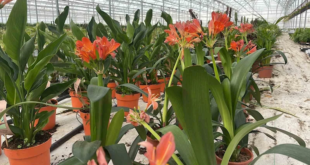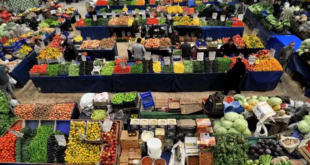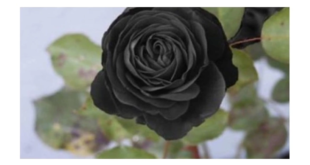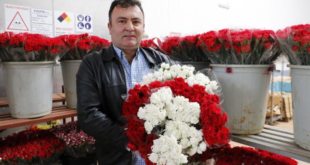The black rose (karagül), which is grown only in Halfeti district of the southeastern province of Şanlıurfa in the world and takes its unique color and smell from the soil where it grows, is carefully harvested for use in various fields.
Halfeti, which Cittaslow International Coordination Committee included in the “calm city” network in 2013, is described as the “hidden paradise” of the region with its historical stone houses and natural beauties.
Visited by thousands of people every year, the district is also home to the black rose plant that grows only in the region with its unique geographical features. The growing area of the black rose decreases with the rise of the water of Birecik Dam.
The district governor’s office, municipality and Provincial Directorate of Agriculture and Forestry cultivate the black rose in three greenhouses to spread it over a wide area.
The black rose, which showed its unique black color and smell only to the people of the region due to the new type of coronavirus (COVID-19) measures, began to be harvested by greenhouse workers, cutting off its branches in order to be used in various areas.

Speaking to state-run Anadolu Agency, the Provincial Agriculture and Forestry Director Murat Çakmaklı said that the black rose is a plant identified with Halfeti.
Çakmaklı said that many regions where the black rose was grown remained under water.
“Of course, we express it as the hidden smell of our paradise Halfeti. It is a flower identified with Halfeti, blooming in spring and autumn. It turns black first and after a while it changes its color to dark red. However, it takes this black color only in Halfeti. It was found in the studies in other places that the black rose did not turn black and grew in different color tones. It takes this black color and smell from the climatic feature of Halfeti, the water of the Euphrates River and the feature of the soil of this region. When these three important features come together, the black rose shows up in black. It is a fragrant and noble plant.”
Çakmaklı stated that they carried out studies in order to expand the production areas of the black rose in the district and provided training to local people.
Tea, Turkish delight, perfume produced from leaves
Stating that the Black rose started to blossom about three weeks ago and harvested, Çakmaklı said, “There are three greenhouses in Halfeti, within the body of the district governor’s office, Municipality and Provincial Directorate of Agriculture and Forestry. Black rose blossoms in a period of six-seven weeks. When it buds, it turns black. It is harvested when it turns black. After harvesting, it is left to be dried on the strings in the greenhouses. When it is completely dry, it is then packaged according to its usage. It is put in gift packages; tea and Turkish delight is made from its leaves, perfumes are produced from its scent.”
Stating that they are also working for the branding of the black rose, Çakmaklı stated that it would find more marketing and branding opportunities with the Ministry’s Digital Agriculture Market (DİTAP) Project.
He explained that only the local people had the opportunity to see the black rose due to the epidemic, and said, “Unfortunately in the spring, visitors will not be able to see it, but it will blossom again in autumn because it blossoms twice a year. Hopefully, many visitors will have the opportunity to come and see it in autumn this year. We have prepared gift packages for people who cannot come here. They will be sent if requested.”
www.hurriyetdailynews.com
 THE GLOBAL WINDOW OF TURKISH FOOD AND AGRICULTURE The Global Window of Turkish Food and Agriculture Sector
THE GLOBAL WINDOW OF TURKISH FOOD AND AGRICULTURE The Global Window of Turkish Food and Agriculture Sector









